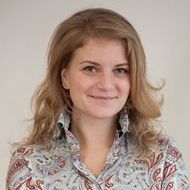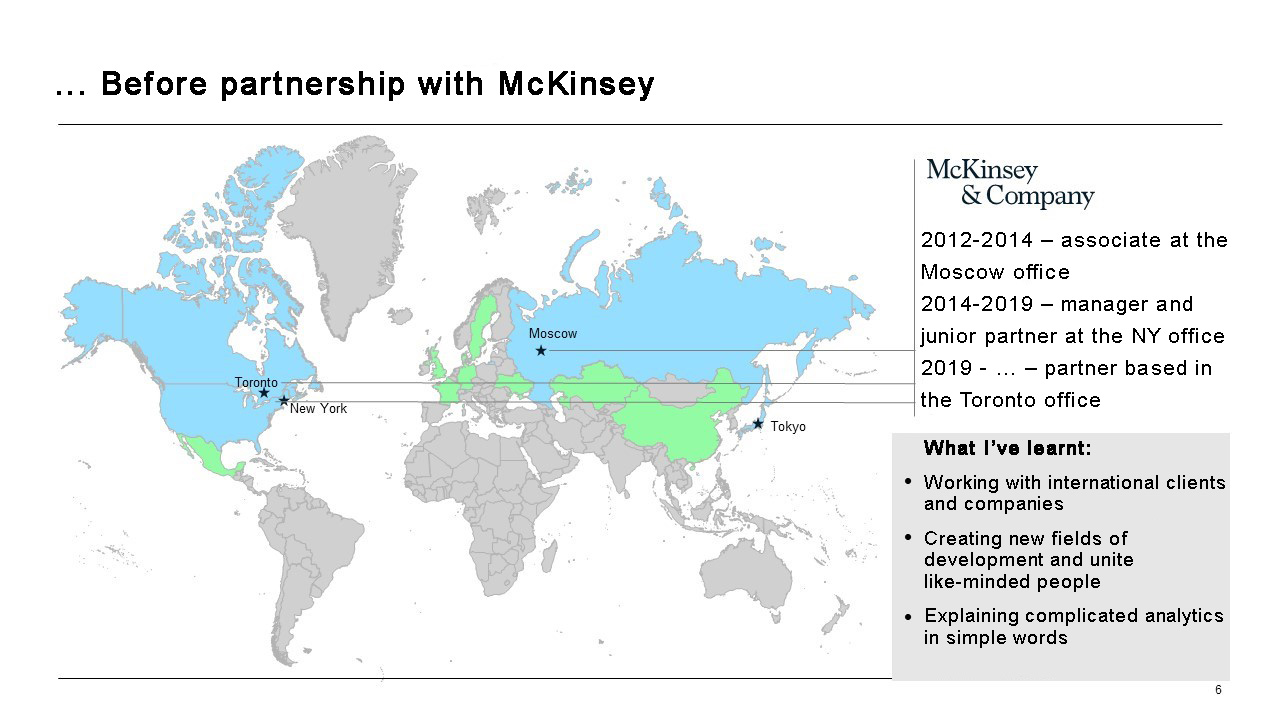‘HSE University Graduates Are an Elite Who Can Show Excellent Results and Achieve a Lot Both in Russia and Abroad’

Elizaveta Vityuk is a graduate of the HSE Faculty of Economic Sciences, and a partner in McKinsey&Company, the largest global management consulting company. Elizabeth spoke to HSE news service about her career path, her work as a consultant and about the tasks that she has to solve.
About My Studies at HSE University
HSE University has shaped me in many ways and determined my career path. I identify myself as an economist, but my education is largely based on the application of mathematical methods. After graduating from HSE University, I came to work for Danone in Russia as well as in France. I have been working at McKinsey for almost ten years. It is a global consulting company that helps various enterprises, government agencies, public organizations and even entire states to improve their work. My clients are mainly companies in the consumer goods and retail sector, and I founded and led the Predictive Growth practice at McKinsey. Below I’ll explain in more detail about what we do, how we help companies to better understand consumers by using analytics, and how to create products specifically for them.

Elizaveta Vityuk
In 2004, I enrolled on the bachelor’s programme at the HSE Faculty of Economic Sciences as the winner of the All-Russian Olympiad for School Students. HSE University was a revelation for me in terms of open-mindedness and teaching methods. In 2004, there were very few universities where modern science was actually taught. By modern science I mean the science that is interesting, applied, and at the same time taught at a sufficiently expert level. I was particularly lucky, as when I started my master’s studies, my supervisor Emil Ershov helped me to identify my talents.
I will always remember 2008 — the time of the crisis, when everything started to collapse, and I started working. I felt the economic downturn deeply: it affected my family and the decisions I made. I realized how useful it would have been if I could have studied my master's programme online! But this option was unavailable back then, and so I rushed from the office to university every evening. Fortunately, everyone treated my difficulties with understanding and helped me overcome them.
The main thing that HSE University has provided me with is critical and structural thinking. The level of teaching was very high, and each student was treated as an independently thinking person, who should not only learn something, but also critically comprehend the material. For me, this has been the biggest contribution to my entire career.
During my studies on the ‘Mathematical Methods in Economics’ Master’s Programme at the Faculty of Economic Sciences, I acquired strong fundamental analytical skills, which proved invaluable when, about ten years later, I applied them in my work. When I finally found like-minded people inside the company where I worked, and we started building data analysis methods, these skills came into their own. I am immensely grateful for all the classes both on time series and on probability theory.
I thought I would never use these skills. But three or four years ago, they became most desirable on the labor market
And surprisingly, I already had them.
In addition, HSE University taught me to work with data. The world is now described by big data. Companies are absolutely obsessed with the idea that they can and should learn more about their consumers and prepare their products and services for them much more closely than ever before. It's all based on data and the ability to work with it — not to be afraid of the data massive and understand that some of them are of excellent quality, and some are questionable and completely unsuitable for work.
Another important thing that HSE University teaches you is understanding limitations. Not everything can be solved with the help of mathematics and not everything can be described by functions — you need to use critical thinking. I often see people who have learned ideas from smart books and then started to believe that they know the only correct method that can be applied everytime and everywhere. This, alas, is not the case.
About the Career Start
I joined Danone in 2008 as one of the winners of a business game in which my classmates and I had decided to take part, not really hoping for a serious result. As a result, I was offered an internship at Danone, and I decided to try this work. Following this, I was hired, and it became even more interesting. I chose to work on demand planning and took the position of analyst in the Danone demand planning department. Let me explain how it works: Danone, for example, produces yogurts, and these yogurts are ordered by stores - Pyaterochka, a small store, a stall, etc. And somehow you need to predict how much yogurt you need to produce and where to deliver it.
Everything turned out to be completely different from what I’d expected. I thought everything already worked automatically, there were excellent algorithms, and you just needed to improve these algorithms and come up with new ways of analysis. In fact, at that time there were only a few Excel files that were being updated more or less manually. The reality did not match ideas about the scientific potential being used and about its advancement.
I couldn’t understand how we could work like this when there was such a lot of useful data and figures, and why all this data wasn’t being analyzed
At the same time, I came across the concept of ‘use case’: despite the fact that generally you can analyze anything, it is important to understand where this analysis will have the best application, and how this correlates with the time spent on it. After all, it takes time to program everything, and sometimes the situation changes so quickly that it makes no sense to do this. For me, this was a very important transition from the academic environment (where it was vital to choose the right approach, and then everything worked automatically) to an environment in which you need to make a decision which involves compromising something for something else. Is it more profitable to spend more time on programming something, or to meet with the marketing team and discuss what plans they have for advertising on television, which will greatly affect the demand?
I liked working in a team, communicating and looking for like-minded people, because I believe it is very important that people understand priorities equally. If I create an amazing model, but no one is interested in the result, then I have probably wasted my time and could have done something more useful instead. Understanding this allowed me to rise quite quickly in the company: having common goals and priorities is much more important than having the correct economic solutions.
A few years later, I was appointed manager for medium- and long-term planning. I became much more involved in managing the whole process, because after I created the models, it turned out that the availability of data was much more important than choosing the methodology. If the marketing department does not say when they plan to announce an additional discount, then you can predict anything, but demand will grow unpredictably. Therefore, I focused more on managing the right process, so that, for example, before launching a new product, I would ensure the availability of all materials and packaging, the necessary resources for production and distribution and everything esle we needed to know in order to make this launch successful.
About My Transfer to McKinsey
During the last two years of my work at the company, I led the integration of Danone and Unimilk. Despite the lack of mathematical methods, I was really taken with this intensive project work, which allowed me to get real results. I met very different people - from factory directors in smaller Russian cities to investors in Paris. For me, it was a new experience that helped me to discover global perspectives and to apply a project-led approach to my work.
Actually, Danone was a serious stepping stone on the way to today's position as a partner of McKinsey. I loved the culture of Danone and my work there, but decided to take the next step and test myself as a consultant. I started my career at McKinsey as an associate in the Moscow office. I thought it would be interesting to do this work for a year or two, but now, after almost 10 years, I'm still here. Over my years at McKinsey, I have performed various tasks: I’ve worked with banks and the government of one of the CIS countries on building the green economy and reducing emissions into rivers and the atmosphere, as well as optimizing steel sales. All this was quite interesting, but I always wanted to try working in different countries - so that my work became global.

This map shows almost all the countries where I’ve worked. I worked in Tokyo for a long time, then at the beginning of 2014 I transferred to the New York office, where I worked for five years, and two years ago I moved to Toronto. During this time, I participated in dozens, maybe even hundreds of projects, worked with people from completely different countries, with representatives of very different cultures. My clients were companies from different industries, but I realized pretty quickly that I wanted to return to the consumer goods sector, to the work I was doing at Danone.
The first of the most important things that I have learned from my experience is how interesting it is to work with international clients and that the non-verbal cultural component is extremely important for effective team work. Therefore, if you have the opportunity to at least read about things that happen outside the country you live in, and to communicate with people from other countries and see it all, grab this opportunity: it's a wonderful experience that helps expand your horizons.
My second insight happened after I had already figured out what consultants do and what their daily work looks like. I realized that there is a great opportunity to unite people interested in analytics to create new types of services for our clients — services that would be based on understanding and using data, the mechanism of which would be available to everyone, not just to data scientists or experts in this field. For me, it was a revelation to understand how easy it can be and at the same time how important it is to unite like-minded people so that everyone feels that they are contributing their part to the common cause.
One of the most difficult things I needed to learn in order to make my dream come true was to explain very complicated things in very simple words. This helps you communicate with both data experts and a members of the board of trustees, and ensures that everyone understands each other. This is necessary for many heads of organizations or directors of large companies — everything that concerns analytics, online solutions, digital economy, the things they do not work on every day and that they are not always au fait with. Here we can face a hurdle, a rejection of something that is unknown, and even more so if it’s not clear how it works and how it helps in business.
On My Work as a Consultant
You may ask why young graduates are trusted with solving large, complex and critical tasks. Who are these consultants?
McKinsey is a consulting company with the world's largest office network. We have 140 offices. I've probably been to 30 of them, although I still haven't been to all the countries where McKinsey has offices. As for staff, we have approximately 27,000 employees worldwide. Our office in Moscow is growing rapidly. When I first came to McKinsey, there were about 150 consultants there, currently there are 380. The company is actively expanding: there is now a large demand for various consulting services in Africa, East Asia and other regions.

What do consultants do? You've probably heard that consultants often develop business strategies and business transformation strategies. This may be a strategy to enter new markets or a strategy to increase profitability in existing markets. There may be a business transformation strategy when one company buys another and they need to merge, integrating with minimal losses in the efficiency of human capital and corporate culture, while building a single common corporate culture. This may include the optimization of production, operational and business processes: for example, you need to understand in which components of sales and forecasting we lose customers — it may turn out, for example, that customers turn down our products because of our shortcomings in customer support, and they do not know who to contact when they face a problem.
Digitalization strategy is high on the agenda today. This includes the introduction of Agile, or a flexible, adaptive operating model. In most companies in the consumer goods sector or companies that sell something, they think that first of all potential customers will need to know about them online. So, these companies start to analyse how to optimize search engines, and how to use websites or their applications in order to present their goods in the best way.
By the way, with the increase of digitalisation in projects, the teams implementing them have also changed. With the advent of a large number of digital transformation solutions and with changing customer requests that have become more detailed, my typical team now includes several designers, developers, and people involved in the technology architecture, along with a data scientist and a data specialist. There are many colleagues at McKinsey who have come here with industrial design experience. This is an example of a team including people with different competencies, while ten years ago, this was not the case.
The consultant needs an education that will give them structuring skills, provide the ability to think critically and analyze any complex problem, because the tasks are very different. As a person moves up the career ladder at McKinsey or another consulting company, they acquire expert knowledge. HSE University provides an education suitable for this kind of work. After all, it’s rare that a person who’s just graduated from university works as an expert. Graduates who are interested in solving interesting problems and who have the fundamental skills for this join the company. They also need to be hard-working, follow work ethics and have the necessary teamwork skills. All these things are not related specifically to steel production or carbon dioxide emissions, but are related in general to solving problems.
Tips for Students Starting Their Career
Don't be afraid to push yourself, both at HSE University and outside it. Although at the beginning of my career I had a rather chaotic experience, I am very glad that I got into a real company and was able to feel and understand what it's like to be an analyst, working in a team and then leading a team, before testing myself as a consultant. Don’t worry if not all your experiences turn out to be exactly what you expect. More importantly, the world is full of possibilities.
I do believe that HSE University graduates are an elite who can show excellent results and achieve a lot both in Russia and abroad. Use your time now to build a foundation - to accumulate fundamental knowledge and acquire critical thinking skills. I will always repeat how important it is to be a person who thinks critically, not just absorbing technical knowledge about how the economy of a country or the economy of a company works, but also trying to understand how it interacts with the world outside the company.
If, when I was an HSE University student, someone had asked me about the future, I would have never been able to describe my current job. What I'm doing now probably didn’t even exist back then. So, you have a lot of opportunities, and you can create your own dream job. Don’t be downhearted if it seems that your dream job doesn't exist yet. Firstly, it may exist but you just don't know about it yet, or if it really doesn't exist, you can invent it, make it, create it.
And last but not least, invest in contacts, in networking. Your classmates, your teachers, and the people you meet when you participate in conferences or business games are all part of those like-minded people with whom, in a few years, you may come up with some ideas together, implement them and find your life’s work.

